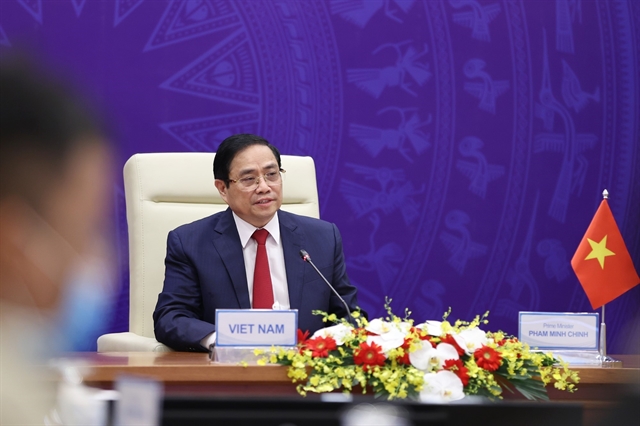 Politics & Law
Politics & Law

Prime Minister Phạm Minh Chính has called on the countries of Asia to put aside their differences and work together to overcome the damage of the COVID-19 pandemic.

|
| Prime Minister Phạm Minh Chính. VNA/VNS Photo |
HÀ NỘI — Prime Minister Phạm Minh Chính has called on the countries of Asia to put aside their differences and work together to overcome the damage of the COVID-19 pandemic.
He was speaking yesterday at the online 26th International Conference on The Future of Asia via video conference run by Japanese media firm Nikkei Inc, along with many other regional leaders.
With the theme 'Shaping the post-COVID era: Asia's role in the global recovery' the delegates focused on discussing the world economic and political situation in the new context, efforts to respond to the COVID-19 pandemic, traditional and non-traditional challenges facing Asia and solutions to create a new era after the pandemic to ensure peace, stability, co-operation and development in the region.
Speaking at the conference, PM Chính stated that more than ever, this is the time that requires all countries to put aside conflicts and disagreements and stay united and support each other to overcome the pandemic.
He said special circumstances require strong and drastic actions and special solutions and Asia needs a new co-operation framework with the necessary breakthroughs to help the economy survive the pandemic and lay the foundation for sustainable and inclusive development in the future.
With such a view, PM Chính proposed five mottos and six co-operation contents to “join hands to build Asia with peace, co-operation and stronger development”.
The five mottos are strong development of internal strength, adaptability and self-reliance; strengthening international co-operation; being people-centred; taking good core cultural values as a foundation, and turning difficulties and challenges into motivations to develop.
The six co-operation contents are developing high-quality strategic infrastructure to stimulate economic growth in the short term, while creating strategic breakthroughs in the long term; promoting the process of economic integration and links in an equal and effective manner in order to ensure the flow of trade, investment and operation of the global supply chain; strengthening co-operation in science and technology, turning digital technology and digital transformation into a driving force to help Asia transform in the post-COVID-19 period; promoting sustainable and effective green growth from the early stages of post-pandemic recovery; strengthening co-ordination to deal with the COVID-19 pandemic and improve the capacity of public health and social security systems, and ensuring an international environment of peace, stability, co-operation and development.
The Prime Minister also said countries need to share responsibilities, respect each other, co-operate equally to benefit. Disputes and disagreements related to the East Sea issue should be resolved by peaceful solutions, with respect to the law, especially the United Nations Charter and the 1982 United Nations Convention on the Law of the Sea.
Countries should also promote multilateral cooperation mechanisms, fully and effectively implement the Declaration on the Conduct of the Parties in the South China Sea (DOC) and work together to negotiate a code of conduct in the South China Sea (East Sea).
Chính said Việt Nam would continue to overcome difficulties to develop the country based on three main pillars: the depth of the nation’s history, human resources and natural resources. He said the Vietnamese market with 100 million people has many strengths, including institutional elements, geography, social stability, investment environment as well as human resources.
The conference, one of the leading policy dialogue forums in Asia, has been organised annually by Nikkei since 1995 with the participation of senior leaders, business professionals and scholars from Asian and international countries.
This year's conference was also attended by the PMs of Japan, Nepal, Pakistan and Thailand, as well as top leaders from Laos and Singapore and more than 500 delegates comprising business people, scholars and representatives of regional and international organisations.
The Future of Asia forum was cancelled last year due to the COVID-19 pandemic. — VNS




